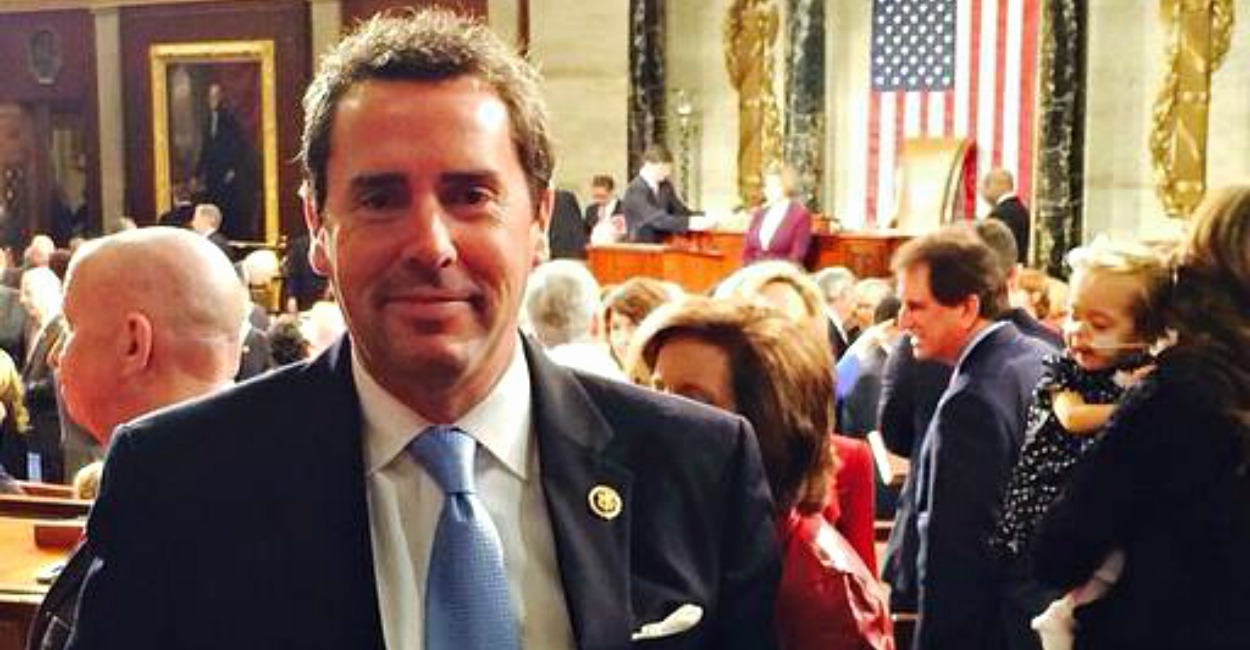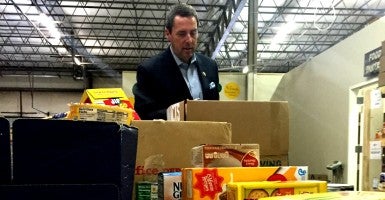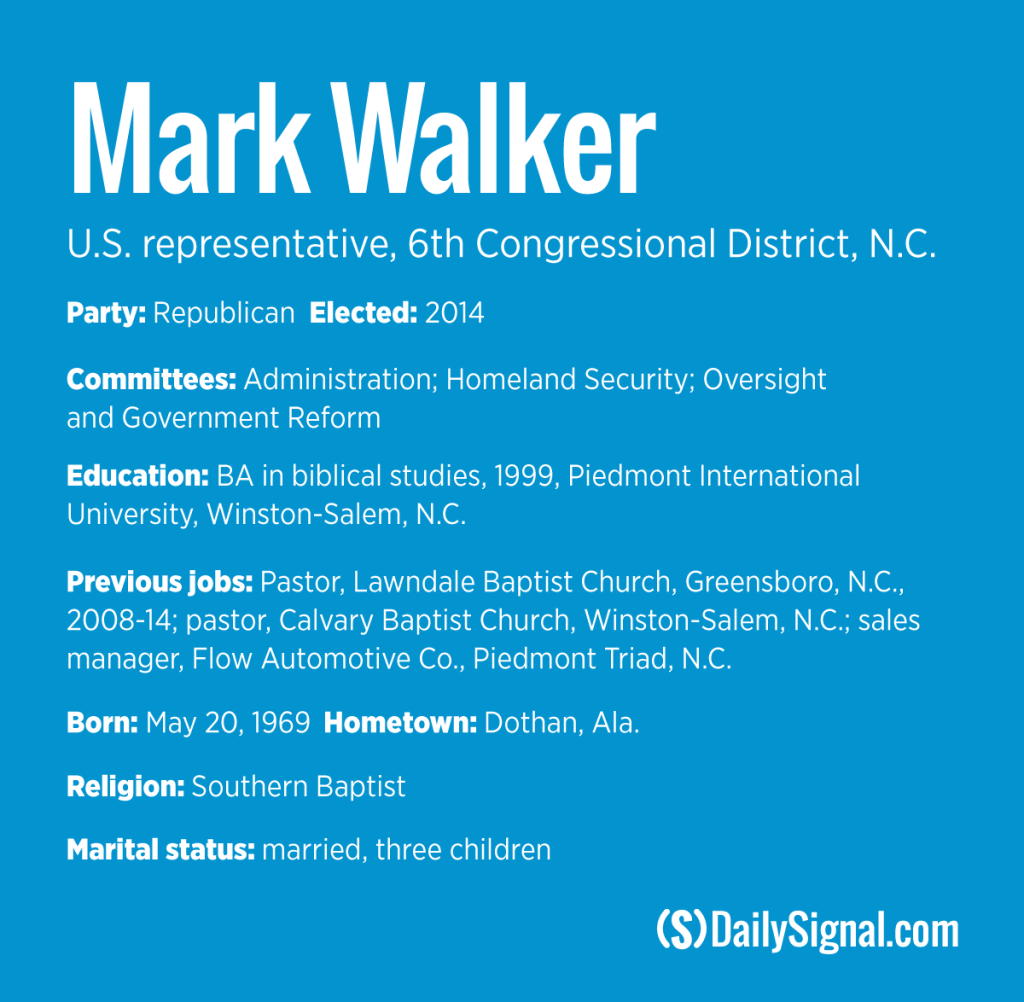Greensboro, N.C.—Mark Walker spent his childhood in and out of prison. He wasn’t an inmate, but the chaplain’s son at one of Alabama’s minimum-security state prisons, Berrydale Forestry Camp.
And starting in elementary school, he followed his father while he made the rounds offering a message of salvation to inmates.
“I remember the joy on their faces that their lives matter, that somebody took the time to invest in them,” Walker, 46, recalls.
Sitting on prison bunks, watching his father work, that’s where Walker says he learned the lesson of acceptance, of “looking beyond whatever social background, and just trying to see the person as an individual.”
Now a freshman U.S. representative from North Carolina, Walker is trying to teach fellow congressional Republicans a new operating doctrine: Put people before policy and change your tone—especially when addressing social issues like poverty.

Rep. Mark Walker says he used to be “the Sean Hannity of Christianity.” (Photo: Office of Mark Walker)
A Baptist minister by vocation, Walker explains that mentality during a recent prayer breakfast in a section of a church gymnasium crowded with more than 60 local pastors.
“There was a time [when] I was the Sean Hannity of Christianity,” he says. “It was simply about winning the argument. And God had to work in my heart during my early 30s and ask me, ‘Is it about winning or making a difference?’”
Walker said he often sees the same tendency in his party. But he insists there’s a better way to communicate.
“I have to be willing to invest in the person first,” he explained, “I have to put the relationship before the policy. Otherwise my words fall on deaf ears.”
‘A System Designed to Fail’
It’s not that Walker wavers when it comes to principles. In fact, he has become a sort of conservative darling in right-wing circles, speaking at events hosted by The Heritage Foundation and Hillsdale College. But though he thinks Republicans get the principle right at the 30,000-foot level, he tells The Daily Signal, the party struggles to deliver at the 300-foot level.
“I think we’ve failed at that,” Walker says. And to fix it, he’s developed his own brand of political evangelism, meeting regularly with neighborhood leaders, church pastors, and nonprofit directors. That, he says, is “how we communicate that message of liberty, hope, and opportunity.”
But that’s a hard sell to make in North Carolina’s 6th Congressional District. The High Point-Greensboro metropolitan area includes some of the poorest and hungriest communities in America.
According to a 2015 Gallup poll, High Point-Greensboro ranks as the worst in the nation for “food hardship,” where almost a third of families literally struggle to put food on the table. It’s not much better in surrounding Guilford County. The U.S. Department of Agriculture has charted 17 “food deserts,” communities that lack consistent access to a grocery store and fresh food.
It’s socio-economic ground zero of what Walker considers the failed War on Poverty.
“We declared war in the 1960s,” he tells reporters gathered in his district office, referring to President Lyndon B. Johnson’s anti-poverty crusade. “And in some places, we have a higher percentage of poverty than we did 50 years ago.”
Surveying that carnage, Walker measures the casualties not just in empty bellies but also in warped mentalities. He’s most troubled by how the poor see themselves in relation to the state:
When you’re dealing with people in either rural or inner-city poverty, and all they’ve been taught is that the federal government is the end-all, be-all of every need they may ever have … then we’ve created a system designed to fail.
Walker says he wants a new campaign driven by local communities—not the federal government—something that empowers individuals to overcome “a mindset of dependence,” and one that’s suited to 2016, not 1964.
‘Willing to Sacrifice’
But the politician doesn’t offer that lecture to his constituents. And the minister doesn’t deliver a sermon about conservative orthodoxy, either.
“You can scream, shout, and holler,” Walker says. “You can say things like, ‘Well, this person shouldn’t be in poverty or that lady shouldn’t have had three kids out of wedlock,’ or whatever offensive thing.”
Instead, Walker tries to build credibility.

Rep. Mark Walker decries “a system designed to fail” in fighting poverty. (Photo: Tom Williams/CQ Roll Call/Newscom)
“Either you genuinely love these people or you don’t,” Walker says. “But if you genuinely care about them, then you’re willing to sacrifice what you think to develop a relationship … to sacrifice, to get out of your comfort zone.”
And as The Daily Signal follows Walker during a tour of groups on the front lines of fighting poverty, it’s evident by his actions that this isn’t just a sound bite.
That’s why at Project Re-Entry, a local program working to prepare prisoners for life on the outside, Walker remains uncharacteristically quiet for a politician. Mingling with reformed convicts at the facility, he listens to their stories more than he speaks.
No Quick Fixes
Later at Backpack Beginnings, a nonprofit that sends children home with meals after school, Walker skips the speech again. Moving instead with an efficiency seldom seen in Washington, he deploys his staff to sort through hundreds of canned goods for the food pantry.
And it’s why Walker helped create the HOPE Commission, a coalition that operates inside his district to empower local residents to help each other thrive. It’s not about quick fixes or photo ops, he insists.
It’s “not just [about] what we call catastrophic relief,” Walker says when laying out the vision for the group he helped found. It’s about “building a long-term bridge to help people ascertain their way out of poverty.”
A coalition of pastors and community leaders, the group works to offer a helping hand to those struggling to escape power. Working at both the neighborhood and county level, Walker’s commission connects experts looking to give back with those who need help the most.
Just a year old, the Hope Commission has sponsored food drives, clothing donations, and free dental clinics—services that can make a world of difference for North Carolina’s poor.
‘Spoon-Feed Them’
Back in Washington, Walker keeps the same intensity but at a lower profile. And his work in North Carolina has impressed many in the conference already.
Former House Republican Conference Chairman J.C. Watts, R-Okla., sees an oversize role for the soft-spoken minister.
“Do I think Republicans do a good job [addressing poverty]? I think Republicans do a poor job,” Watts tells The Daily Signal. “It might take someone to take them by the hand and spoon-feed them.”
A pioneer of the GOP’s effort to address the issue in the early 1990s, Watts says Walker might be the “one to carry the torch inside the conference” on the issue.
The party’s current brass agrees. House Speaker Paul Ryan, R-Wis., says Walker made his priorities immediately clear.
“Since his first day in the House, Mark has made it very clear he’s committed to finding a people-up approach that helps get people out of poverty,” Ryan tells The Daily Signal.
The speaker from Wisconsin has recruited the freshman from North Carolina to advise a congressional task force developing new ways for Republicans to finally win and end the old War on Poverty.
“The condition of your birth shouldn’t determine the outcome of your life,” Ryan says, “and I am honored to work alongside someone like Mark in this fight to restore the American Idea.”
































